|
So what do kids really want to know about you, their music teacher? Your political leanings? Your FICA score? Your favorite instrument? If you haven’t read “What Do Students Want To Know About You? –Part One”, check it out before continuing? Got Part One covered? Read on and see my top three things that kids want to know about you. Triangulation Students want to know if you are kind and empathetic to children younger than they are. They triangulate and predict how you will eventually treat them by observing how you treat younger children. Do they have the ability to see that in your classroom? No, they’re all the same age. Where they will observe this teacher behavior will be on the bus court, in the cafeteria, in the hallways of the school. They will see you without the artifice of a classroom around you. They will see you as a human being. They will carefully observe how you treat younger kids when you are under stress. When they observe you help a child open up their milk bottle at lunch time, when you show empathy and help to a child who's fallen and scraped their elbow, when you can take a knee, look a little one in the eyes, smile, and give a word of encouragement or praise, big kids take note. They don’t need another adult to respond with the emotional content a parent. They want something different, Provide it. Similarities In my case, the one thing that I told students that often astonished them was this: I was just like them at their age. I would draw a line on a chalkboard that was about two yards long and it one end of the line, I wrote the word “you” and at the other end of the line, I wrote the word “me”. Maybe I didn't wear a black suit and a tie or where expensive shoes – but I was like them. In some schools I was able to tell kids that I grew up several minutes away from where our classroom was, which always made them wonder if I lived around their home. I consoled them that if they didn't have some of the finer things in life, I was like them. For example, my family didn't own a car until I was six years old. As I was sharing this with them, I would occasionally erased the line several times, each time redrawing it shorter and shorter, until at the end of my few sentences, the line was only about three inches long between the “you” and “me”, which allowed me to say, “You see, we're a lot closer and alike then you could probably ever imagine. The Most Important Thing They Want to Know What kids really have a need – not simply “want” – to know is do you really want and need to know about them. This is easily one the hardest elements of being a teacher. At least it was for me. As I got older, I kept getting reassigned to larger schools. My last school had approximately 2,500 kids and every kid thought that aside from knowing their name that I knew their middle name, their pet’s name, and their favorite three colors. It was a lot of data. I struggled. Maybe it was my advanced age, maybe I was burning out, but just the elemental need to learn that many names was hard for me to accomplish. It was the undertaking that I put the most energy into and, conversely, too often came up short. Names are important. I often reviewed names and faces from the online school data base before classes. I tried to make up for my weak grasp on hundreds of names with a lot of “What do you think?”, “Tell me about that.”, “How did that make you feel?”, and other open ended questions that gave them opportunity to share and for me to shut up and listen. The older I got, the more seasoned my skills, the better I was at being quiet and paying attention, the more skilled I was at listening instead of making sounds, the more I sought to understand rather than be understood, the better I got at helping how kids defined me in their minds. When it comes right down to it, kids want to know that you have a soul, that you know how to engage it, that you employ it not because you want to but because there is no other way to be a musician than to lead with your soul. If we remind ourselves that we are there to serve children and that they aren’t there to serve us, we will be on the right road. We will be on the best path to telling kids everything they need to know about their music teacher. When you face a classroom of students, they are immediately sizing you up. My father used to say, “First impressions don't count, people usually wait sixty seconds before they have you completely understood.” So what do kids want to know about you? Do they want to know where you live or where you went to school? Do they want to know your GPA or the highlights of your curriculum vitae? Do they want to see your wedding pictures, vacation pictures? Some teachers share way too much personal information with students. Better to keep your personal cards close to the vest and share personal stories when they mesh with a point you’re trying to get across in class. Know that when kids walk into your music room, you were just the next in a long line of successive music teachers that they've encountered or will encounter: some good, some bad, never indifferent. They’ve been collecting data. Now you’re their specimen. Here are some of the things they want to know about you. Confidence Kids want to know how quietly confident you are about your skills as a musician and teacher. They want to feel safe and the way you project confidence will go a long way to assuring them that it's not just about that you've “got the skills to pay the bills” but that they can trust you and depend on you. Groove They want to know if you have a sense of rhythm, and if you can convey that sense of rhythm both vocally and instrumentally. What Are You? They want to figure out if you see yourself as a teacher or as a musician. There's a big difference. Music teachers who see themselves primarily as teachers have a way of being supervisors, passers of judgement, season ticket owners of the highest seat on a pedestal with their classes beneath them. Musicians, on the other hand, tend to be on the same level as their students. Think of the musician’s world as a long road. A music teacher who sees himself or herself first as a musician will picture himself or herself on the same road as his student, with the teacher just a little further down the road than where the students are. Skill Set Kids want to know if you can actually make the music with your hands and voice or if you have to rely on technology. They will definitely judge you on this. A Funny Thing Happened on My Way to the Classroom . . . . They want to know if you have a sense of humor, if you can be funny and most importantly if you can laugh at yourself. Just how thick is your skin and how ticklish is your funny bone is important to them. Don’t Hate the Player, . . . . Students want to know how prone you are to misdirection, how easy a mark are you, how easily you can be played. Notice I didn't say IF you’re prone to misdirection, because all of us as teachers are occasionally misdirected by students. I am reminded of the advice Michael Caine gave to actors: “Never, never blink, it's a sign of weakness”. As music teachers, when kids try to redirect us, it's a good idea to curtail all blinking, especially when kids try this next misdirection ploy. The kids’ favorite tactic in redirecting the teacher is by asking question. This might be news to you but you don’t have to entertain every raised hand and question in real time. I routinely snapped, “Put your hand down! Do not interrupt!”, “Do you see a sign saying interrupt the teacher whenever you feel like it?”, or “Did I ask a question?” When we would go to “Go” time, and the kids were on break, I would always ask the questioning student what was it that he wanted to say. After a while, kids figured out that raising their hand was not an immediate way to redirect me. In fact, it was a way to potentially attract my ire. Lean In or Fall Back Kids want to know if you lean into situations or fall back. When a behavior situation needs addressing, it's better to be prepared and be ready to lean in rather than to look indecisive and fall back. Sometimes, giving the impression of leaning back while being proactive is the best approach. It’s also important that you, as the teacher, are not there to be King Solomon and arbitrate and solve every problem, especially when kids should be empowered and instructed in ways to solve their own problem. This next thing that kids want to know about you is the one that you've really got to impress upon kids and you really can't do it in your classroom with them because they're all the same age. We’ll cover the remaining top three things kids want to know about you in “What Do Students Want To Know About You? - Part Two”. Enough!
Enough already! I continue to see outraged music educators who are insulted by the Infiniti car commercial with the elementary school orchestra murdering Strauss’ “Also Sprach”. It’s a joke. Get over it. By bringing attention to your outrage, you make yourself appear to have no sense of humor. You seem socially oblivious and unable to relate to the average parent of a kid just starting with an instrument. Average parents get the humor. So should you. The proper music teacher response is to wryly shake your head and say, “Yeah, somedays when they first start, it does sound like this.” Fight the urge to add the sanctimonious, “But it gets better” or “But they’re really trying”. Leave it. There are hundreds of ads with kids playing instruments or singing where their talent ranges from nil to super star. Infiniti is allowed to add to the list of ads featuring kids making music. The only people getting upset at this ad are music teachers. I’ve even read of the director of a youth orchestra taking umbrage. From CBS News: “The New Brunswick Youth Orchestra has a message for automobile manufacturer Infiniti.: “If they needed musicians who knew how to play, they should have called us." No, I’m sorry. You don’t seem to understand the humor and hook of the ad. Portsmouth Sinfonia much? They don’t need an excellent orchestra of teens – they need images of little kids trying to sound like adults, comically playing large instruments, and falling short. See, accomplished high school players . . . . ah, forget about it. Explaining a joke is like dissecting a frog: they both die during the process. If I have any problem with the ad, it's this: It exposes the dirty little secret harbored by many music educators. My observation is that most music educators wouldn’t have given a tinker’s damn if the ad had featured a horrendous sounding elementary school-aged rock band. You would see no Facebook or Twitter posts, no indignation, no outcry from the lofty perches of music educators. The rock ad would come and go in their world without a ripple, other than possibly a swarmy comment like “Yeah, learn to play rock and roll and that’s what you’ll sound like”. Why is that? For starters, most music educators have limited experience playing rock and even less expertise in teaching it. And, after all, it’s rock. It’s not . . . . . Classical music! Ahhh, the holy of holies, the sanctum sanctorum of musical styles, classical music. Every time society throws a humorous pebble at classical music or music education, music teachers transparently respond emotionally and take it personally. They act as if they own the European, classical methods and instruments that they teach and couldn’t be bothered with guitars, basses, drum kits, and screaming singers. That sort of thing is for the riff raff. Most music educators would rather venerate at the altar of their patron saint, Saint Greg. You may know him by his pseudonym, Professor Harold Hill, a 1912 con man hustling mid-west kids and families for a living in Meridith Wilson's "The Music Man". Professor Hill’s saving grace? Along with his bad boy heart of gold, he was pushing classical band instruments and one of Ludwig’s classical hits, the “Minuet in G”. While this Infiniti ad will come and go, the sting that it inflicted on snowflake music educators will have an infinite half-life and never go away. Frankly, they should be thankful that a national ad campaign even features kids playing in an ensemble. Take a tip from Elsa: Irving Berlin, who couldn’t read music, wrote most of his songs in the key of F# major. He considered the key of C the preferred key for classically trained composers.
By now, I hope you know several hundred songs and that you can play/perform them in several different keys. I’m going to suggest that you know all of them additionally in the key of C major. If they are minor, use A minor, the relative minor of C major. Why? And why the key of C? The key of C is perfect for this exercise because it has no accidentals – any that are added will clearly take the song in a new direction. The idea is not to learn songs in the key of C for performance. It’s for analysis and understanding in a common key. Think of the key of C as the Rosetta Stone for understanding the elments and of songwriting Once you learn every song in C, you will immediately start to see similarities from song to song that you might not have noticed before. This is important especially when learning standards and tunes from the Real Book. When songs modulate, you will start thinking not in keys but in intervals. For example, “The Way You Look Tonight” starts in D and modulates to F. If you learn it in C, you’ll start to think that it’s I going to a flat iii. You’ll become more adept in thinking in numerals as well as in the first seven letters of the alphabet when you visualize songs. These common structures will be building blocks in the songs YOU write so it pays to master them all in one central key and then move them around to where the song dictates. Maybe you’re a musician.
Maybe you play out. And maybe you play in bars. I was just reading some comments by friends who were exercised about the conditions of playing live music in bars – specifically how vexing it is that TVs are sometimes left on above or near the performing musicians. Been then, endured that, always solved the problem. Pro Tip #1: Be a problem solver, not a problem causer. Smile. Pro Tip #2: Don't try and change the world, just make your current GPS (gigging positioning spot) a little bit better for everyone involved and not just yourself. I get it. That kind of stuff can feel demoralizing. Personally, I have no problems playing in a bar. My teachers played in bars and taught me how to play in them as well. It’s noisy, people are there to have fun, and I am there to oblige them. But one crucial fact remains: If it’s a bar, . . . it’s a bar. It ain’t the Sistine Chapel, your living room, a listening room with sofas on the Main Line in Bryn Mawr that serves choco-molto-lattes, or the Royal Albert Hall. It’s a bar . . . and they have been this way for CENTURIES. You must remember that bars are not designed for respect. Their prime directive is quick consumption of copious amounts of alcohol. If you are a musician and a bar is where you are looking for respect for your craft, you’re looking in the wrong place. If you think that having the TV on is disrespectful, how will you feel about drunks and people who scream and laugh like hyenas? Because stuff like that happens a lot of the times in bars. How will you feel about dinnerware sometimes crashing to the floor, about the idiots who yell “FREEBIRD!”, about dodging vomit in the parking lot at two in the morning when you’re loading out? If that stuff rattles your teacups, maybe bars are not the place where you should play. I don’t want to lay the whole “walking ten miles to school in the snow” Boyd Holmes retrospective on you but . . . . when I was in high school, the first night I played a gig at the Havre de Grace VFW, I asked the bartender while we were setting up why there was a floor-to-ceiling collapsible chain link fence on either side of the stage. “You’ll see’” was all he said with a laugh. By midnight, all those old drunk guys started throwing stuff at the stage, a la Blues Brothers. Red Solo cups of beer, plates with food, all flying through the air directly at the band. The bartender ran up, closed the fence but by 1AM, I was drenched in thrown beer and Italian salad dressing. And in the category of "it's not a bug, it's a feature", for every beer that was thrown at me, some old vet kindly bought one for me. All in all, a good time was had by all. When I play at the Hotel DuPont, it’s a different vibe. I never had to contend with bar variables when I played in the Green Room or Gold Ball Room. Think: elegance. If it’s a bar, expect all the possible variables of a bar environment. Do not expect things to globally change because you object to what goes on in a bar. If it has been this way for CENTURIES, why would anyone expect it to change now? Because. . . you care? Because . . . it offends you? Everyone is absolutely entitled to their emotions, needs, and wants – but everyone has to be candid to the realities of a bar paradigm that has existed for centuries. If the TV set is blaring, I have found that if I just politely say something to the bartender, they’ll usually fix it. Bar owners and bartenders have a hundred and one priorities on their agenda from paying customers that far outweigh the concerns of the musicians. Remember, many musicians are probably getting paid LESS than the bar back. When have bar owners ever been even remotely concerned about the working conditions of bar backs? Never. To expect anything different than what has existed in perpetuity is indulging in wishful thinking. My advice if you’re gigging at a bar: Go with the flow. Don’t bitch about the mix. Have fun. Know the crowd’s requests and play them loud. However . . . Don’t like all the stuff associated with bars? There is a remedy. Don’t gig in a bar. Play weddings in country clubs. Much more refined, pays better, and their loading docks are tidier. Plus, you get to wear a tux (see Exhibit A). Write a good kid’s song.
Sixteen bars tops. Something with only three or four chords. Something with the range of an octave or less. Something with primarily one syllable words. Keep it simple. If you are like most, you’ll find that writing complex is a lot easier than writing simple. If you’ve had the opportunity to do any audio recording, you might be familiar with the term “ducking”. Without getting into the weeds, ducking has to do with lowering several of the audio signals in the mix for a short period of time to allow another signal to rise above the other tracks.
If you listen critically to a song on the radio, you will notice how ducking is used to allow little guitar fills and percussion bits to cut through the mix. Ducking’s primary use isin adding clarity to the lead vocal. When I write songs, I always have the concept of ducking in the back of my mind. After the introduction to the song, the accompaniment is ducked a few decibels so the melody can be introduced with less clutter behind it. At the end of the first vocal phrase, the accompaniment will probably rise a bit and duck again at the introduction of the next phrase. This pattern will continue through the song with each successive phrase until the chorus is hit and the accompaniment is at its most sustained loudest, nudging the melody’s volume and emotional content. Ducking, like all audio mixing techniques, should be as transparent as possible and not distract the listener but rather sustain the listener’s line of thought. One of the greatest weaknesses in the early songs we write is forgetting how a static accompaniment quickly gets boring and automated. Be careful to constantly varying your accompaniment volume (as well as density and texture) as you develop your melodies. If you keep ducking in the back of your mind, it will be like having an audio engineer working with you – namely, you. The beauty of this paradigm is that when you turn to the audio engineer and start to say, “I need more of me.”, it’ll be you and you will have already read your mind and bumped up your volume! |
AuthorBoyd Holmes, the Writer Archives
June 2025
Categories |
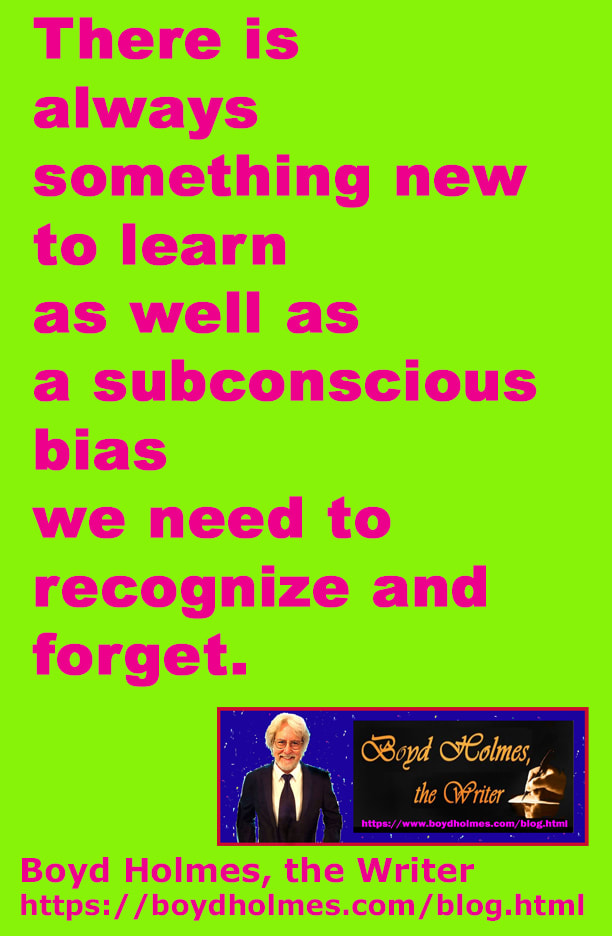


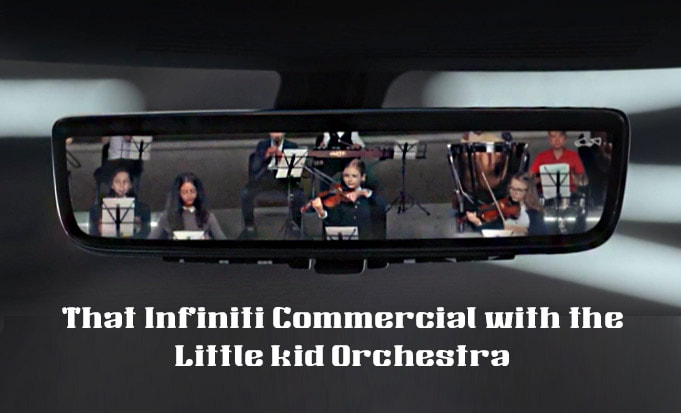

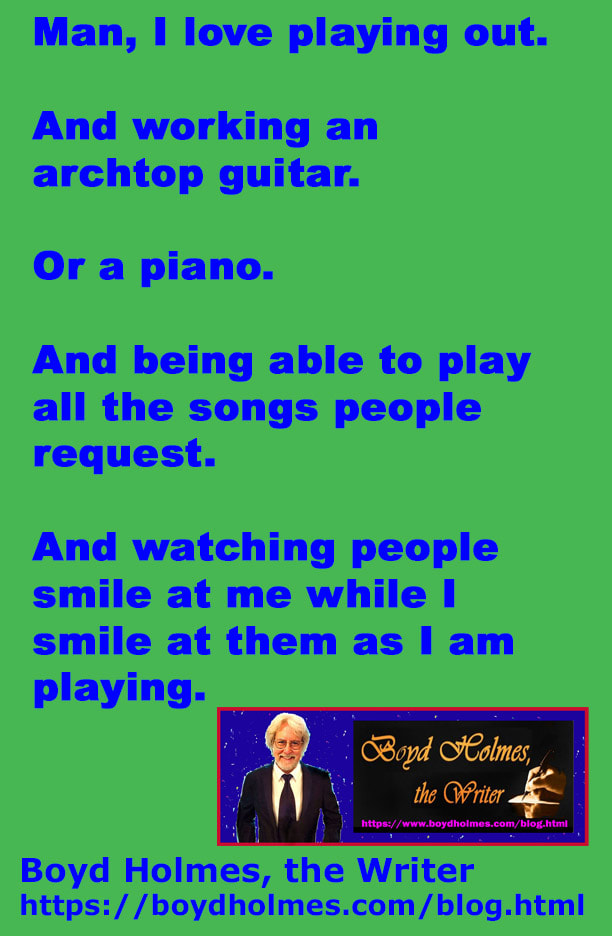

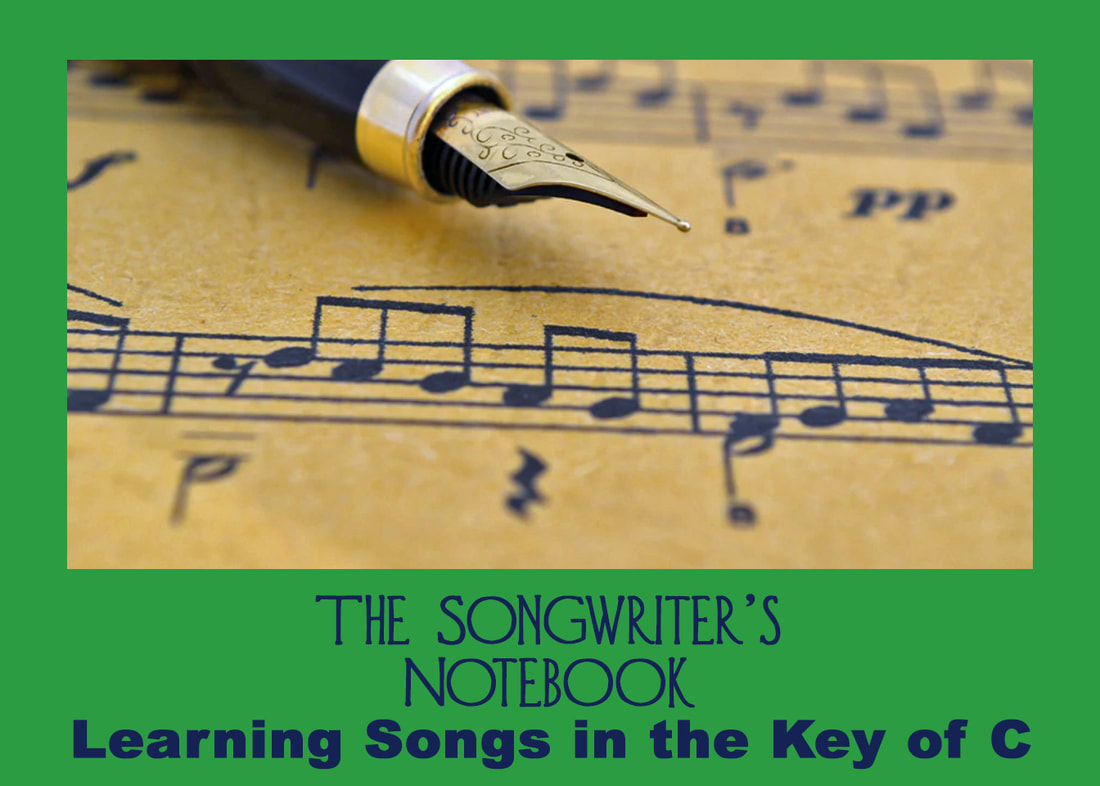

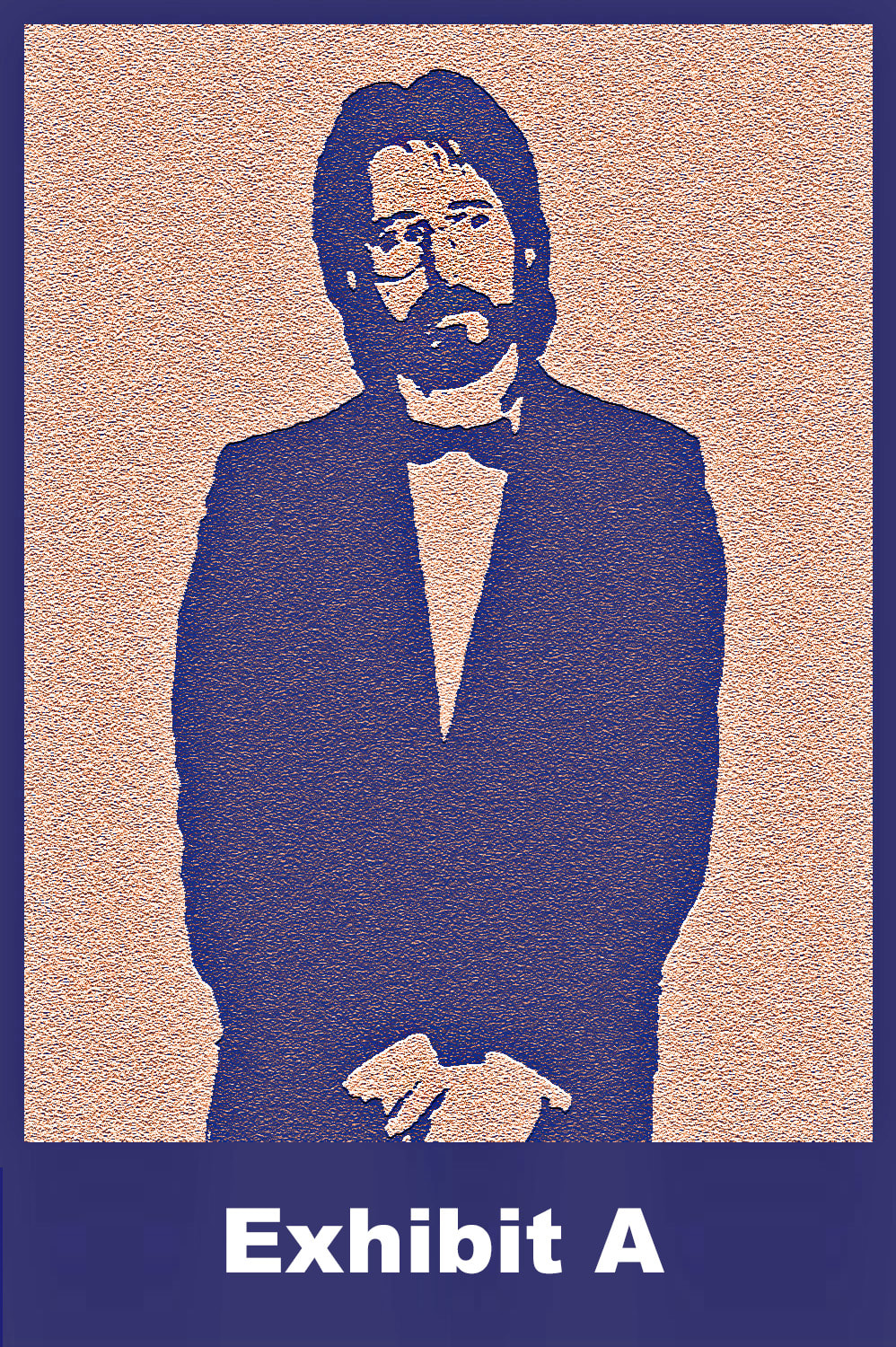
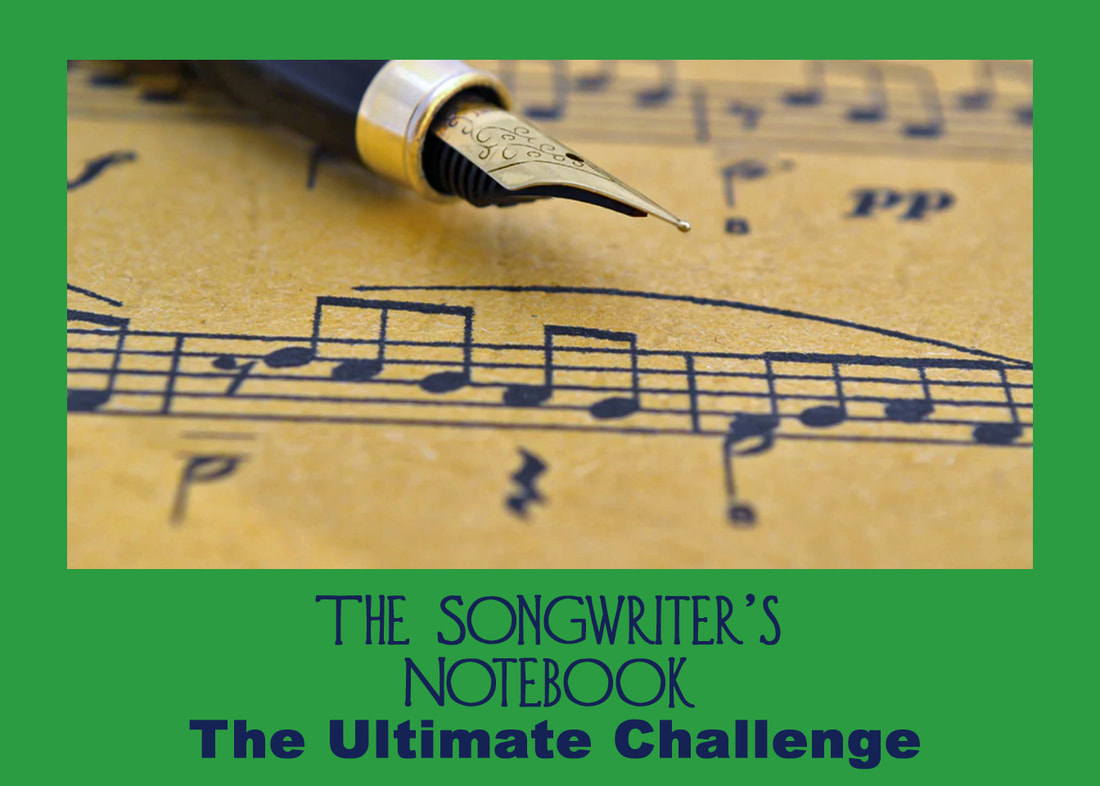

 RSS Feed
RSS Feed